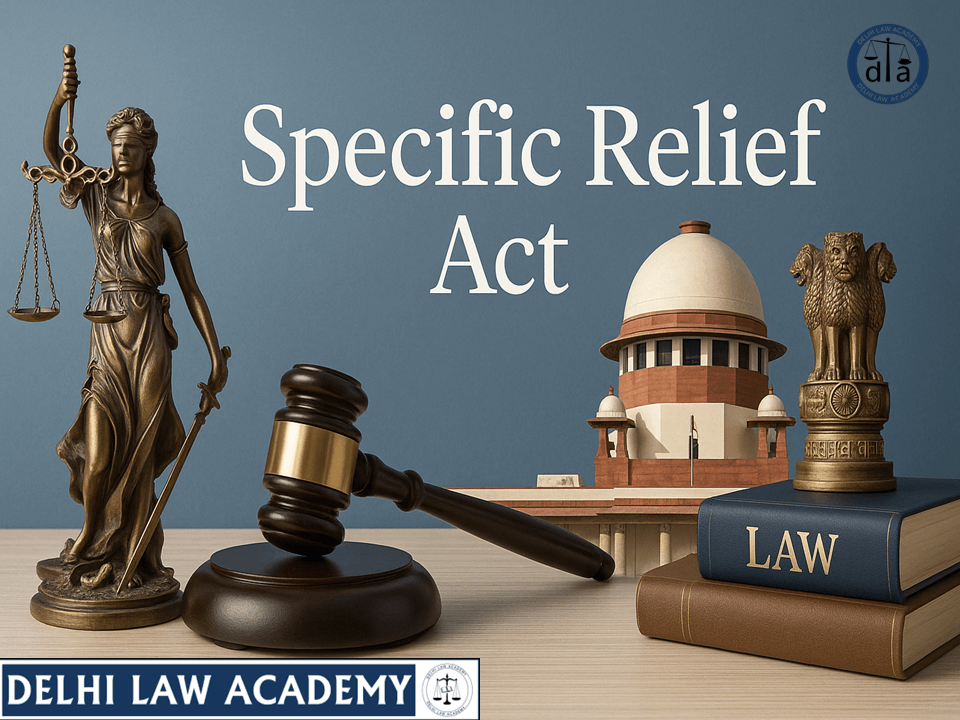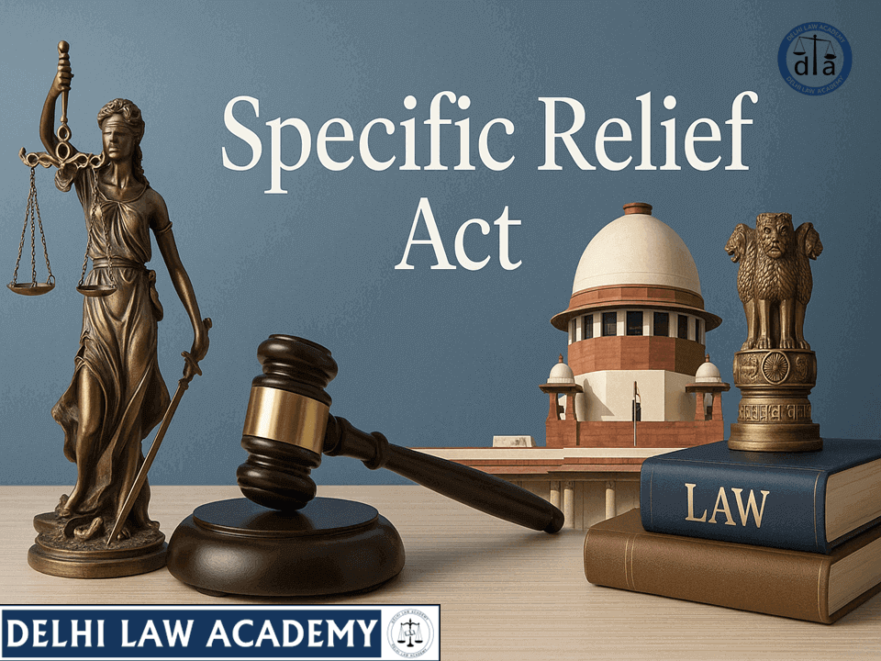
⚖️ SPECIFIC RELIEF ACT: DECREE FOR SPECIFIC PERFORMANCE AT A PRICE HIGHER THAN THAT STIPULATED IN THE AGREEMENT
Supreme Court in Satya Jain v. Anis Ahmed Rushdie [2012]
• It must however be emphasized that efflux of time and escalation of price of property, by itself, cannot be a valid ground to deny the relief of specific performance.
• The twin inhibiting factors identified above if are to be read as a bar to the grant of a decree of specific performance would amount to penalizing the plaintiffs for no fault on their part.
Delhi Law Academy Jaipur presents below for aspirants of Rajasthan Judicial Service (RJS), DJS, PCS (J) and other Judicial Services throughout India a very important judgment of the Supreme Court of India in Satya Jain v. Anis Ahmed Rushdie [2012].
Presented below: Summarized version [by Delhi Law Academy Jaipur] of the Supreme Court Judgment in the case of Satya Jain v. Anis Ahmed Rushdie [2012] granting a decree for specific performance, but at a price higher than that stipulated in the Agreement.
Original language of the judgment has been maintained; it has not been disturbed or replaced.
In this case the Supreme Court granted a decree for specific performance of the agreement to sell, but at a price higher than that stipulated in the Agreement.
📜 J U D G M E N T
The total sale price was agreed at Rs. 3,75,000 out of which a sum of Rs.50,000 had been acknowledged to have been paid by the purchaser (plaintiff) to the vendor (defendant) by means of an account payee cheque. The vendor was to execute the sale deed within a period of 15 months. The purchaser, in turn, was to pay to the vendor the balance sale consideration after deducting the amount of Rs.50,000.
🤝 Whether the Plaintiff was, at all times, ready and willing to perform?
The demand for the additional payment of Rs.1 lakh by the defendant was clearly made by the defendant’s legal notice dated 06.11.1972 which, admittedly, the plaintiff had received. In his reply dated 14.11.1972 the plaintiff had unequivocally stated that under the terms of the agreement he was required to pay, at the defendant’s request, further amount(s) only to the Income Tax authorities which he is ready to do, if a request is so made by the defendant.
What, therefore, has to be addressed by the Court is whether the demand raised by the defendant for an additional amount of rupees one lakh for the purpose of facilitating the issuance of the Tax Clearance certificate and the refusal of the plaintiff to pay any such amount renders either of the parties in default of the terms of the agreement dated 22.12.1970.
Under clause 7 of the agreement, clearly, the obligation of the plaintiff was to pay to the Income Tax department such sum (not exceeding the balance consideration payable) as may be requested by the defendant. Neither clause 7 nor any other Clause of the agreement had cast upon the plaintiff a duty to tender any further payment to the defendant or to credit the bank account of the defendant with any further advance amount after payment of the initial amount of Rs.50,000.
In as far as the obligation to pay the Income Tax Department as contemplated by clause 7 is concerned it has been already noticed that the plaintiff had repeatedly asserted in the correspondence referred to above that he was always ready and willing to pay any amount (within the balance consideration payable) to the Income Tax department so that the necessary tax clearance certificate can be issued in favour of the defendant. Nothing has been brought on record by the defendant to show that any demand or request had been made by him to the plaintiff for payment of any amount to the Income Tax Department.
In the present case not only the language of clause (7) of agreement dated 22.12.1970 is clear and unambiguous there is no other clause in the agreement which had obliged the Plaintiff to make any further payment after the initial part payment of Rs.50,000/-. The obligation of the Plaintiff was to pay any further amount(s) to the Income-Tax authorities, at the request of the defendant, in order to facilitate the issuance of the Tax Clearance Certificate. No payment to the defendant beyond the initial amount of Rs.50,000 was contemplated by all.
The above would appear to be consciously intended by the parties so as to exclude the possibility of any substantial monetary loss to the plaintiff in the event the defendant is to resile from his commitment to execute the sale document. The intent of the parties, acting as prudent businessmen, appears to be clear. An obvious intent to exclude any obligation of the plaintiff to pay any further amount (beyond Rs.50,000) to the defendant is clearly discernible. Consequently, resort to the principle of business efficacy by the High Court to read such an implied term in the agreement dated 22.12.1970, in our considered view, was not warranted.
No straitjacket formula can be laid down and the test of readiness and willingness of the plaintiff would depend on his overall conduct i.e. prior and subsequent to the filing of the suit which has also to be viewed in the light of the conduct of the defendant.
Having considered the matter in the above perspective we are left with no doubt whatsoever that in the present case the Plaintiff was, at all times, ready and willing to perform his part of the contract. On the contrary it is the defendant who had defaulted in the execution of the sale document. The insistence of the defendant on further payments by the plaintiff directly to him and not to the Income Tax authorities as agreed upon was not at all justified and no blame can be attributed to the plaintiff for not complying with the said demand(s) of the defendant.
⚖️ Whether specific performance is to be decreed?
The ultimate question that has now to be considered is whether the plaintiff should be held to be entitled to a decree for specific performance of the agreement of 22.12.1970.
🕰️ The twin inhibiting factors
The long efflux of time (over 40 years) that has occurred and the galloping value of real estate in the meantime are the twin inhibiting factors in this regard. The same, however, have to be balanced with the fact that the plaintiffs are in no way responsible for the delay that has occurred and their keen participation in the proceedings till date show the live interest on the part of the plaintiffs to have the agreement enforced in law.
The discretion to direct specific performance of an agreement and that too after elapse of a long period of time, undoubtedly, has to be exercised on sound, reasonable, rational and acceptable principles. The parameters for the exercise of discretion vested by Section 20 of the Specific Relief Act cannot be entrapped within any precise expression of language and the contours thereof will always depend on the facts and circumstances of each case.
The ultimate guiding test would be the principles of fairness and reasonableness as may be dictated by the peculiar facts of any given case, which features the experienced judicial mind can perceive without any real difficulty. It must however be emphasized that efflux of time and escalation of price of property, by itself, cannot be a valid ground to deny the relief of specific performance.
The twin inhibiting factors identified above if are to be read as a bar to the grant of a decree of specific performance would amount to penalizing the plaintiffs for no fault on their part; to deny them the real fruits of a protracted litigation wherein the issues arising are being answered in their favour. From another perspective it may also indicate the inadequacies of the law to deal with the long delays that, at times, occur while rendering the final verdict in a given case.
💰 Award of additional compensation to the vendor
The aforesaid two features, at best, may justify award of additional compensation to the vendor by grant of a price higher than what had been stipulated in the agreement which price, in a given case, may even be the market price as on date of the order of the final Court. Having given our anxious consideration to all relevant aspects of the case we are of the view that the ends of justice would require this court to intervene and set aside the findings and conclusions recorded by the High Court of Delhi and to decree the suit of the plaintiffs for specific performance of the agreement dated 22.12.1970.
📄 Sale deed at a price higher than that stipulated in the Agreement
We are of the further view that the sale deed that will now have to be executed by the defendants in favour of the plaintiffs will be for the market price of the suit property as on the date of the present order. As no material, whatsoever is available to enable us to make a correct assessment of the market value of the suit property as on date we request the learned trial judge of the High Court of Delhi to undertake the said exercise.
************
📚 Continue Your Specific Relief Act Preparation
Don’t stop here! Strengthen your knowledge of the SRA with our other fully solved tests:
📘 Free Study Material for Judiciary Aspirants!
Download our FREE study material prepared by Delhi Law Academy’s expert faculty.
💬 Frequently Asked Questions – Specific Relief Act & Property Price Decrees
+
+
+
+
+
+
Contact us
📍 Delhi Law Academy – Jaipur Branch
6C, Tower 2, Coaching Hub, Pratap Nagar, Jaipur – 302033
📞 Phone:
+91 9911916552
+91 8447285606
✉️ Email:
contactus@delhilawacademy.com

